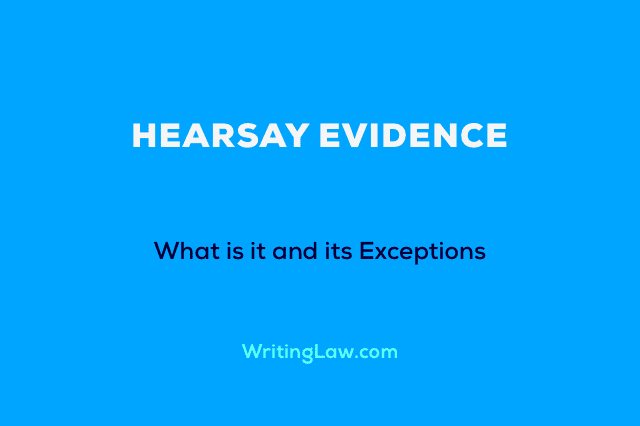
What Is Hearsay Evidence
According to the Indian Evidence Act, hearsay evidence is no evidence. Hearsay evidence is not a direct evidence.
The word hearsay itself gives a clue that something which is not directly heard. Hearsay evidence means any information that a person gathers or collects from a person who has first-hand knowledge of that fact or information. Therefore, we can conclude that it is second-hand information.
The general rule is that hearsay evidence is not admissible in a court of law. Section 60 of the Evidence Act states that oral evidence must be direct. The person must directly hear, see, or sense the fact. For example:
- I saw a woman running with a bloodied knife. The information is itself seen by the witness. It is admissible.
- I heard from my watchman that a woman was running with a bloodied knife. It is hearsay evidence. Generally, it is not admissible in court.
5 Exceptions to the Rule of Hearsay Evidence
It is said that “hearsay evidence is no evidence.” Direct evidence is more reliable and acceptable in court. But there are some exceptions to this rule. Here are five instances when hearsay evidence is accepted by the court:
1. Res Gestae
The rule of res gestae means ‘the facts which form part of the same transaction.’ This rule is given under section 6 of the Indian Evidence Act. The statement of a person may be proved in court through another person who appears as a witness in court if the fact that he states in court forms a part of the same transaction.
2. Admission
Admission is also an exception to the rule that says hearsay evidence is no evidence. Section 17 of the Indian Evidence Act defines admission as a statement, either oral or in the form of a document or electronic form, which gives inference to any fact in issue.
If a person in the court makes a statement against his own interests, then the court accepts such a statement on the ground that a person shall never make a statement against his own interests.
3. Confessions
Confession means when a person admits his guilt in court. Confession has nowhere been defined in the Indian Evidence Act. Section 24 to section 30 of the Indian Evidence Act deals with the provisions relating to confession.
If a person gives an extra-judicial confession that is outside the court, it may be proved through the testimony of that person to whom such confession was made. Though the witness did not hear himself or see anything related to the offence. But the confession by a person may be proved through his testimony in court.
4. Dying Declaration
Section 32 of the Indian Evidence Act talks about the statement of a person who cannot be called as a witness in court.
There might be a situation when a person is on his deathbed or suffering from any disability due to which he cannot appear before the court. In such cases, if the person gives his statement to any other person relating to his death or cause of death, then the person to whom such statement has been transmitted may appear before the court as a witness and give hearsay evidence as to what he heard from the declarant.
For More: Dying Declaration Under the Indian Evidence Act
5. Evidence Given in Former Proceedings
If the person to be called as a witness dies or due to some other reason, is not able to appear before the court, then the statements given by such a person in former or previous proceedings may be used as a piece of evidence for proving the truth in subsequent proceedings.
Even the entries in books of accounts and public registers like official books are relevant statements that can be adduced before the court in matters of inquiry. Though the person may not be alive, the statements he made previously in books or official registers are admissible in court.
Read Next: What Is Doctrine of Exclusion of Hearsay Evidence
- Article 334A of the Constitution of India - 14th April 2024
- Article 332A of the Constitution of India - 14th April 2024
- Article 330A of the Constitution of India - 14th April 2024








Good, precise article.
It means that, provisions are made so that a window of evidence be kept in very hard cases.
However, there is a risk that, this may be used conveniently.
Witness deposes about an occurrence but is unable disclose the source of his knowledge of occurrence. Can the court accept his evidence of occurrence?
Yes, the court will accept it and corroborate with other evidences to be assured. This is what hearsay evidence is all about. It is not a direct evidence. It is not a first hand knowledge. There are some situations in which court accepts hearsay evidences. The article contains the list.